Cast your mind back to the halcyon days when American politics revolved around George H.W. Bush and his delightful locutions. A quintessential Bushism was when he referred to his (hard-to-define) overarching goal as the “the vision thing.” He wasn’t sure what it was and neither was anyone else.
Today’s Democrats have a similar problem. Nobody really knows what they stand for besides being really, really against Trump. That makes it hard to have a recognizable vision for the country since it’s a purely negative politics. What kind of society are Democrats aiming for and how would ordinary people find their place in it?
The problem this presents is underscored by recent survey results from the Searchlight Institute. Their survey queried respondents on what each party wants for your life, covering marriage, having children, being able to retire, being able to regularly go on vacation, having a good job, owning a home, being your own boss, owning a car or truck, feeling stable in your personal life, and creating wealth for your children. Together these attainments make up the basics of what has traditionally been seen as a good life.
The chart below shows how Democrats stack up relative to Republicans on these various attainments. The news is not good for Democrats; indeed, it’s terrible. One of the only “advantages” Democrats have on the chart is that respondents are more likely to say Democrats want none of these attainments for their life. Other than a modest three point advantage on “feeling stable in your personal life,” Democrats are behind the GOP on every other life attainment.
As the Searchlight Institute memo on these data notes:
The outlook gets worse and worse for Democrats the further down the list you travel. The picture that’s painted is one in which voters increasingly see Republicans as the party best suited to helping them build lives of material prosperity and personal achievement.
The Searchlight memo refers to this as the “doomsday” chart for what it betokens about Democrats’ extraordinary inability to inspire ordinary Americans. They simply do not believe Democrats have a coherent vision for how they can “build lives of material prosperity and personal achievement” in a world rocked by rapid technological change and social upheaval.
Perhaps not surprisingly, the outlook does not improve when you narrow this analysis to working-class (noncollege) Americans. As before, the lone Democratic “advantage” is that respondents are more likely to see Democrats as wanting none of the various attainments for their life. And without exception, Democrats trail Republicans on specific life attainments, with notably larger gaps among the working class than the overall population on having a good job, being able to retire, being able to go regularly on vacation, owning a home, and being your own boss.
These patterns make sense when you compare what voters think is important to what they believe is important to Democrats. This chart from Searchlight (corroborated by earlier data from the New York Times and from David Shor/Blue Rose Research) tells the tale. Three of the four issues voters believe are most important to Democrats—climate change, abortion, and LGBTQ+ issues—are least important to voters. If that’s the Democrats’ “vision thing,” voters aren’t buying.
And especially working-class voters aren’t buying. As shown in the charts below from Financial Times analyst John Burn-Murdoch, the Democrats’ identification as the party that represents the working class has declined dramatically over time, while their identification with and focus on sociocultural issues has risen equally dramatically. No wonder Democrats can’t seem to present a compelling vision to the working class; these voters quite rightly see Democrats as preoccupied with issues that are not theirs.
But as the charts above also show, there is an exception to this general pattern: health care. Here is an issue that is both important to voters and perceived to be important for Democrats. Might Democrats somehow transmute this issue into the vision they need for voters?
Certainly focusing on health care could provide some political benefit for the Democrats and is way better than focusing on other issues that are now closely identified with the party. But is it really a substitute for an overarching vision that the party can sell to voters?
This seems doubtful. Voters are searching for a way forward for themselves, their families, their communities and their nation that would restore American purpose and dynamism in a chaotic, populist age. And Democrats’ vision is to restore Obamacare subsidies and protect Medicaid? This smacks of trying to rerun an outdated 20th century playbook in a vastly changed 21st century where the big issues have changed and America is locked in competition with the formidable rising power of China.
Nate Cohn identifies some of what is lacking:
Health care hasn’t been front and center for years. In the final New York Times/Siena poll of the 2024 campaign, less than one percent of voters said health care was the most important issue to their vote [open-ended question]…Ever since Mr. Trump came down the escalator, the basic political conflict between the two parties has changed to something very different than the one that put health care at the fore…
[H]ealth care is unlikely to return to the center of American politics—not anytime soon. Oddly enough, one way to tell is that Republicans seem unusually willing to compromise on Democratic demands. This has given the impression that this shutdown is going better for the Democrats than is typical…Republicans are so willing to compromise only because opposition to government-subsidized health care is no longer a defining issue for conservatives. It’s not 2013 anymore…
[P]olitics today is about the issues that propelled the rise of conservative populism, like immigration or the backlash against “woke,” and the issues provoked by the rise of conservative populists, like executive power and democracy…[C]onservative populists—not only in the United States, but around the postindustrial world—have deliberately sought to neutralize the 20th-century debate over the social safety net…
This story on health care is part of a broader pattern in American politics during the Trump era. On issue after issue, the defining fights of the 20th-century Democratic Party have mostly been resolved, and usually resolved in favor of the Democrats…For a long time, Democrats succeeded politically by promising to protect postwar prosperity against conservatives who would roll back Medicare and Social Security, or against unfair trade deals that shipped jobs overseas. With Mr. Trump promising to protect entitlements and campaigning against free trade, this winning Democratic playbook is gone.
Trade, immigration, the rise of conservative populists and a new left, and Mr. Trump’s own actions have supplied the beginnings of a new political conflict. There’s reasonable political ground for Democrats on many of these issues, but…Democrats would rather turn back the political clock, and fight over health care.
As Cohn implies, that’s just not gonna work…and it certainly doesn’t provide “the vision thing” for 21st century Democrats. What might?
That is a tough question Democrats should be thinking about nonstop, not falling back on chestnuts from the previous century. Probably the best ideas so far have been put forward by the loosely-organized abundance movement. But as I have noted there are some serious shortcomings to the movement as it is presently constituted: it elides brutal cultural issues where Democrats’ unpopular stances satisfy their professional class supporters but repel everyone else; it tends to privilege abundance that those supporters prize, like abundant clean energy, rather than the abundant life working-class voters are looking for; and it is more technocratic than inspirational in the way a proper vision should be.
As I suggested in that earlier piece “an emotional, morally-charged, and nationalistic drive to radically transform our failing system, promote a new era of national development and grand accomplishments and leave the Chinese in the dust” is more like it.
I am attending the Progress 2025 conference this week. It will be interesting to see if the progress movement has something like that on offer. I shall report back.




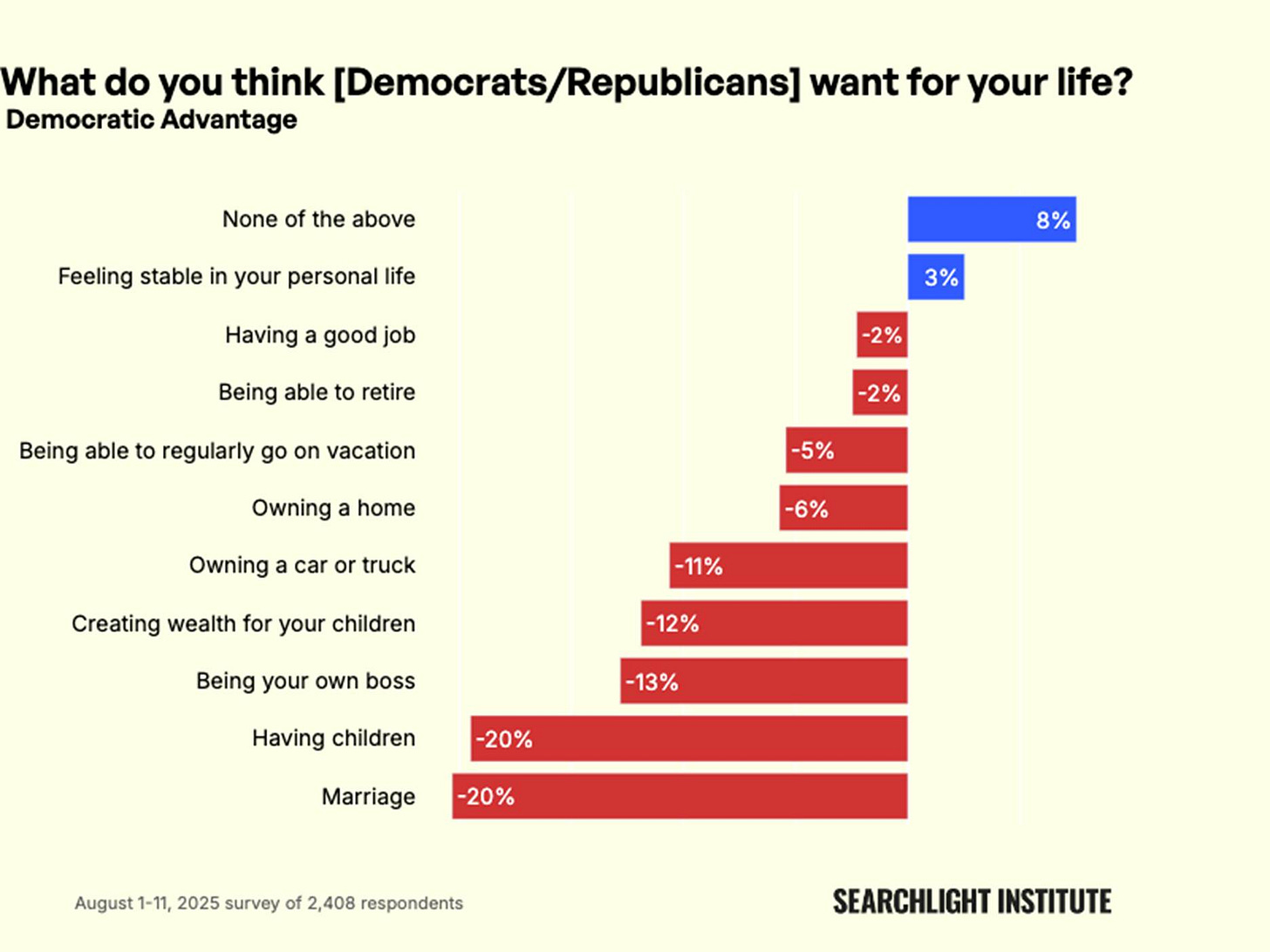
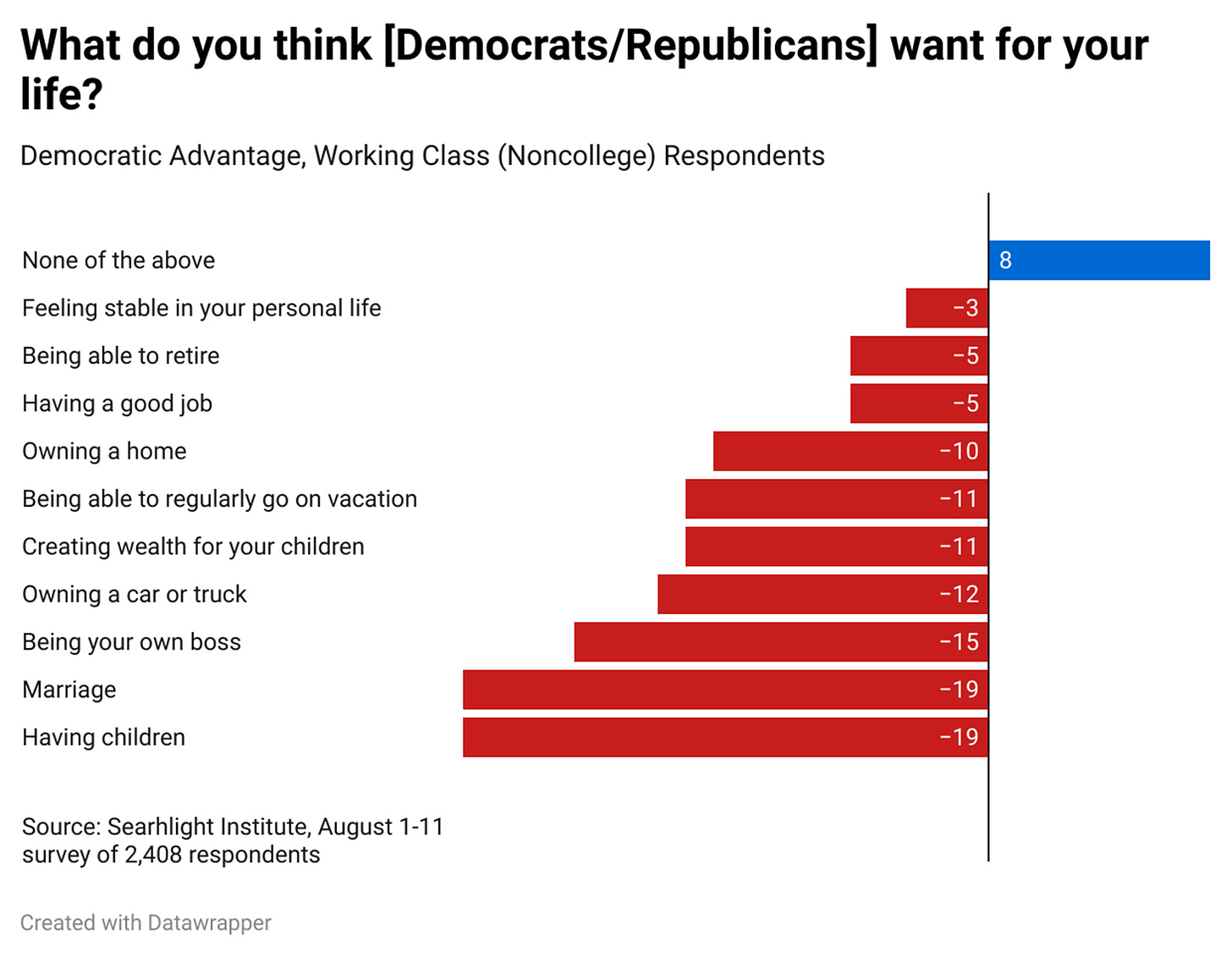
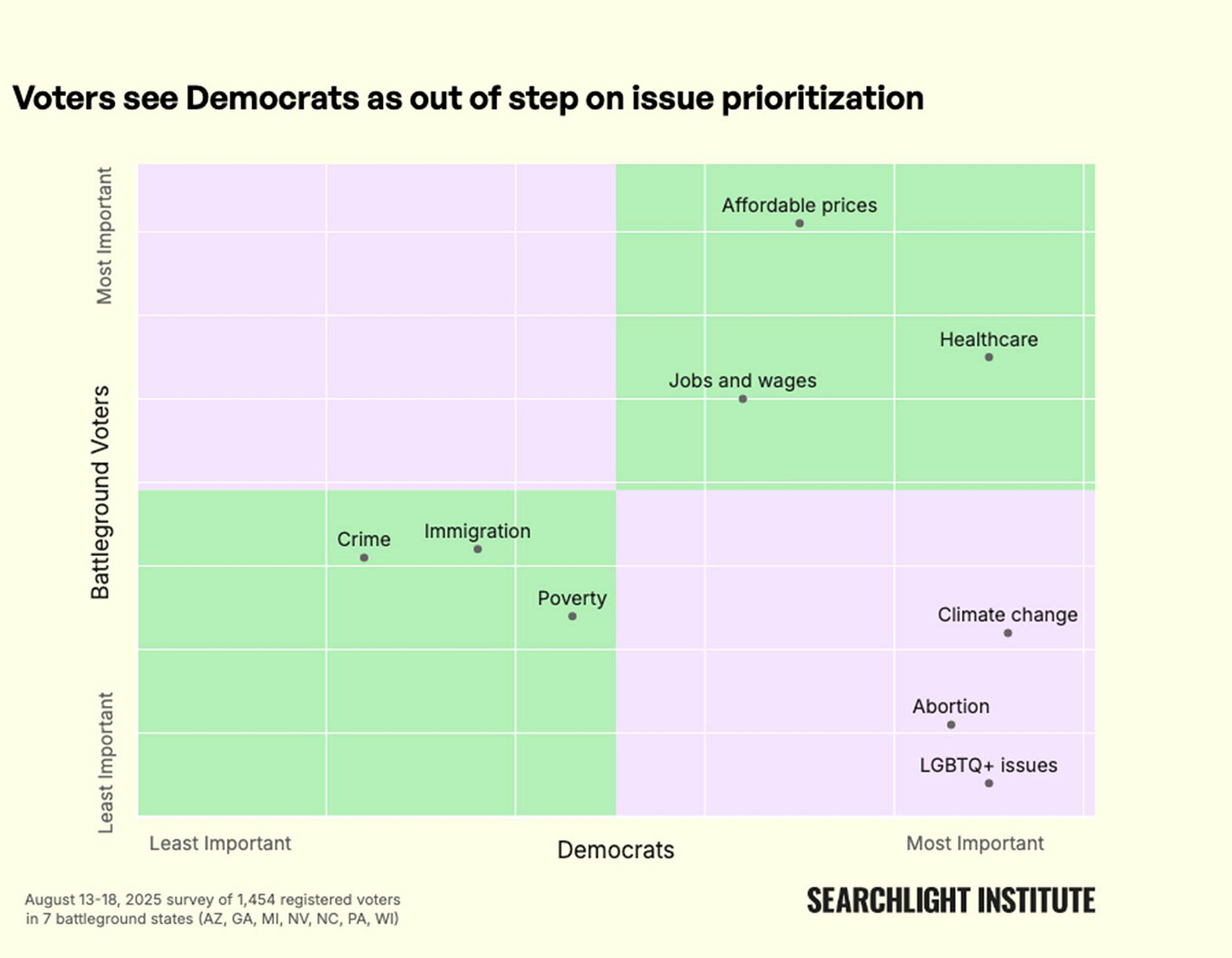
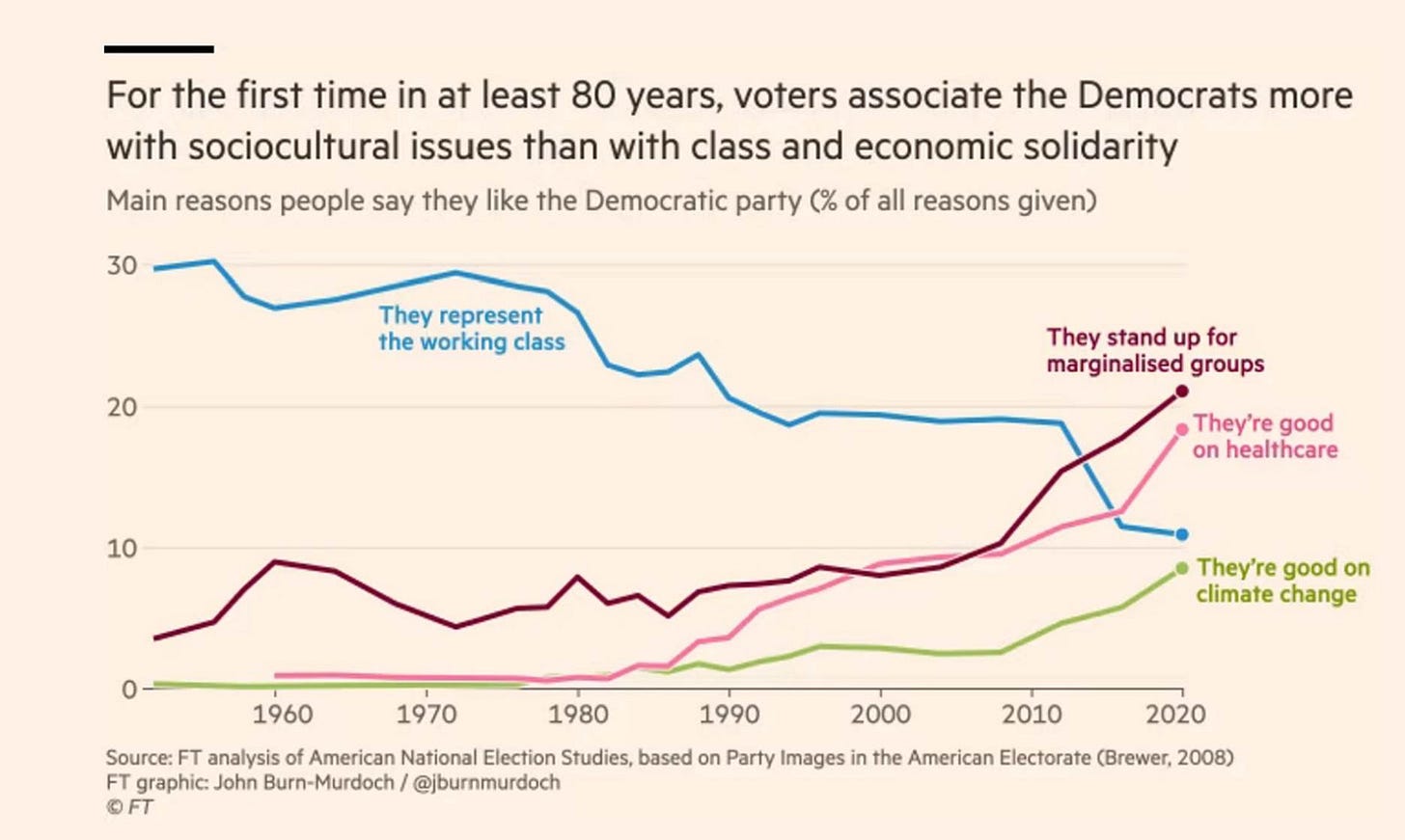
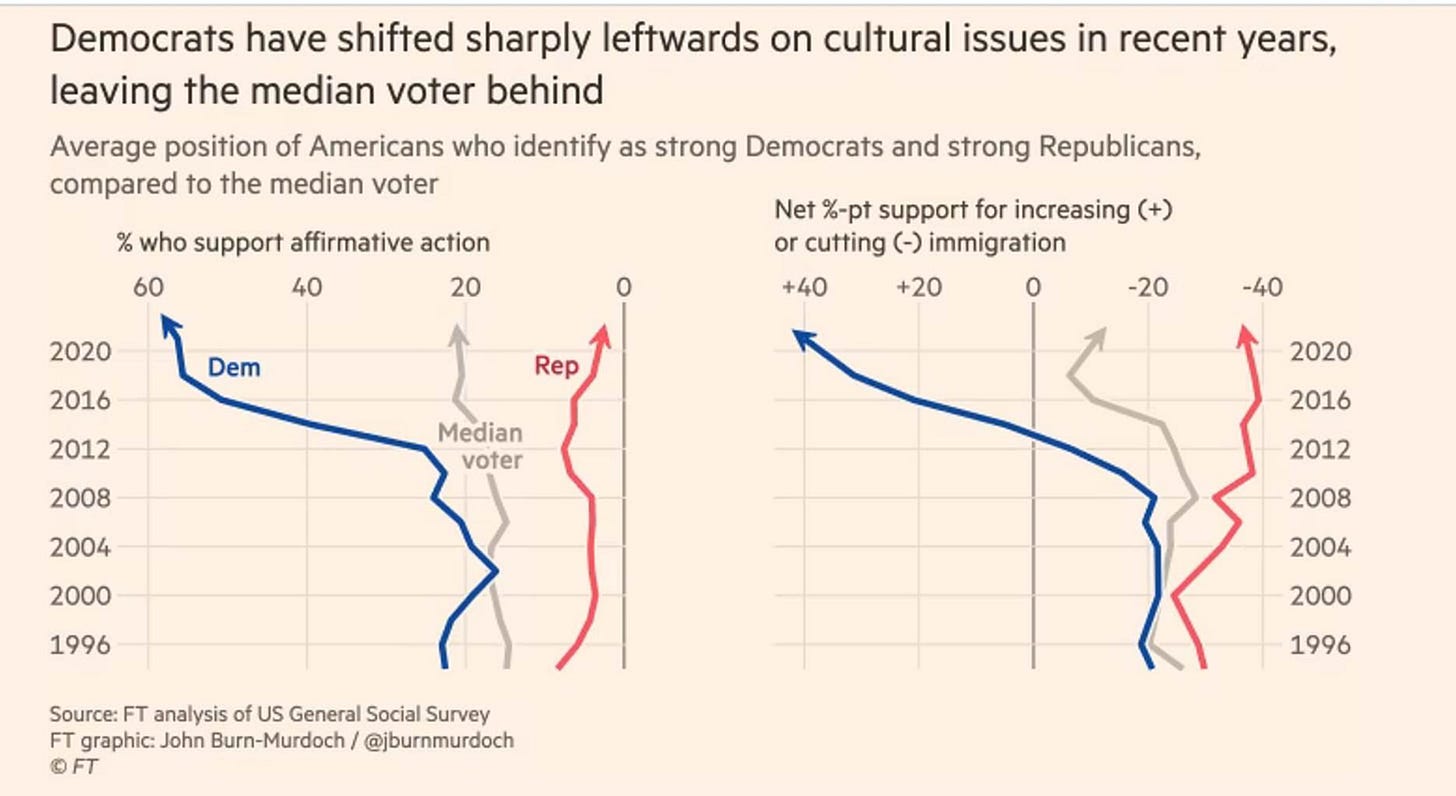
Ok, well, I've stated this before in more subtle ways but here it is: while all those issue bullet points are fine, I think the completely miss Maslow's hierarchy #1, security and personal safety. Underlying all the crime, illegal alien invader stuff is a general perception---and I'm not exaggerating---that "Democrats want me/my family dead." I think while even in polls that would be hard to capture, because I think that while people THINK that they are not yet ready, in large #s, to say it. That is why the rate of leaving the D Party in these registration stats is stunning. Yes, Rs are gaining everywhere, but not as fast as Ds are losing. And with the murder of Iryna Zaerutska/Lakin Riley and before them Kate Steinle, the assassination of Charlie Kirk, the attacks on ICE agents, the news that cartels are working with antifa and other such (well, fascist) groups, people have, I think, already internalized this view ("Democrats want me/my family dead.") Then Jay Jones comes along in VA and says exactly that. So it will take some more voter shifts to make clear to Democrats that this is what has happened.
Right now, mainstream Democrats need to work on getting their party headed back in the right direction to be remotely competitive. Even just stopping the decline.
I say that as someone that's generally a Republican leaning voter. I want a competitive Democrat party so the other side (R) doesn't go off the rails to the right and also provides a credible option if they do.